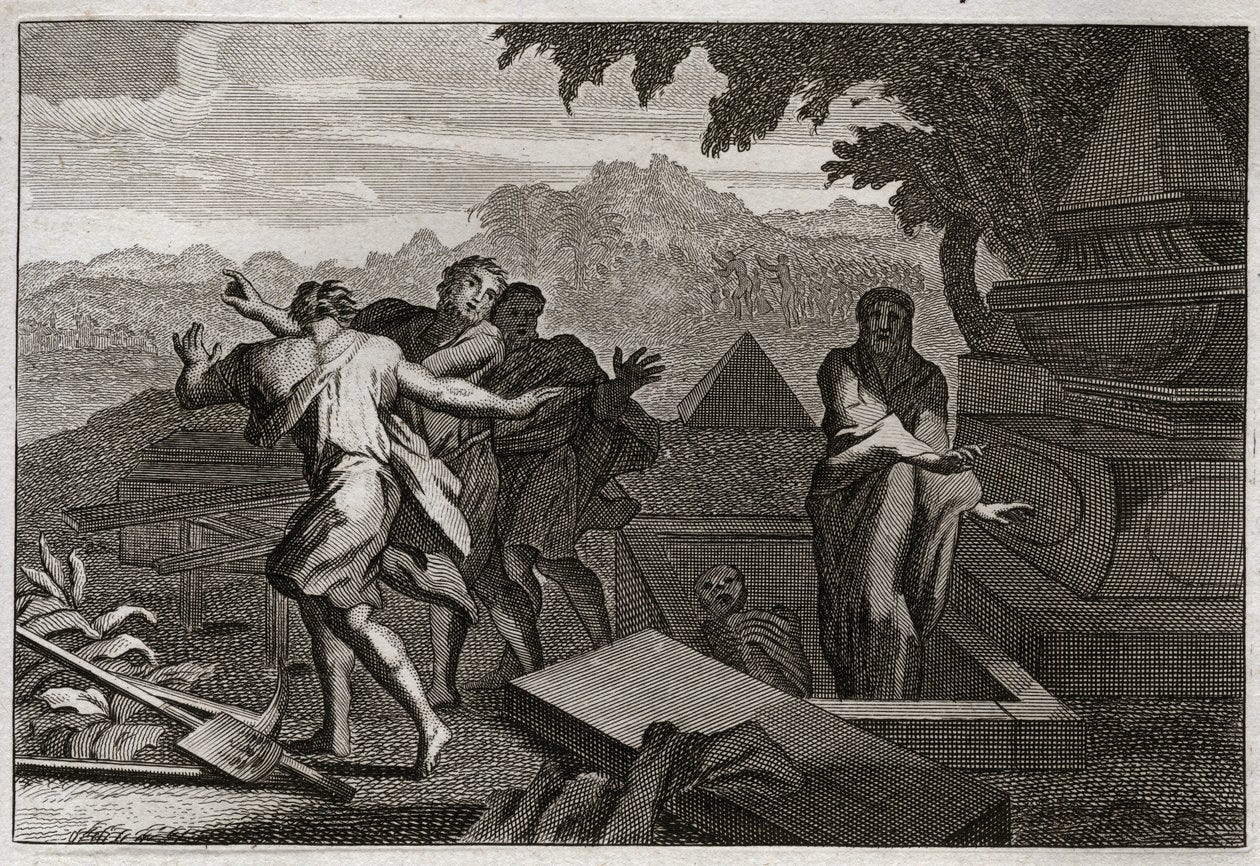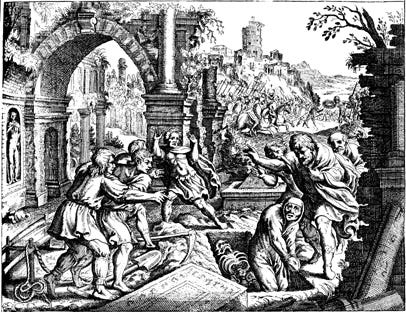Elisha's Bones
Our first stop on our tour of the Wonderful World of Relics is one of the strangest stories in the Old Testament
This post, to quote Professor Tolkien, grew in the telling, and I decided to just let it grow, leaving in a lot of quotes from the Fathers rather than cutting them down. About half of the entire 3000 words is in the free preview, so regular subscribers are still getting their weekly dose of Weird Catholic, and subscribers get something extra. This is my first paywall, so we’ll see how it goes. Here’s a link to the series.
Our passage today is from 2 Kings 13:20-21, and it goes like this:
So Elisha died, and they buried him. Now bands of Moabites used to invade the land in the spring of the year. And as a man was being buried, behold, a marauding band was seen and the man was thrown into the grave of Elisha, and as soon as the man touched the bones of Elisha, he revived and stood on his feet.
Let's begin with the basics. In the purity codes, contact with a dead body made one unclean for seven days (Numbers 9:6-10; 19:11-22), and a high priest was not to touch a dead body (Leviticus 21:11). An unburied body could be a curse upon the land (Deuteronomy 28:26, Jeremiah 16:6), and a man hung upon a tree is cursed (Deut, 21:23). These prohibitions extend to bones and graves as well: "Whoever...touches a human bone or grave shall be unclean seven days." (Nu. 19:16)
And yet, we have examples of patriarchs carrying bones away to give them proper respect. First, Moses:
Moses took the bones of Joseph with him, for Joseph had made the sons of Israel solemnly swear, saying, “God will surely visit you, and you shall carry up my bones with you from here.” (Exodus 13:19)
About this, Rabbi Abraham Ibn Ezra (d. 1164) says:
Now Moses took care to fulfill the oath so that no guilt should fall upon Israel. The bones of Joseph. The bones are mentioned specifically because the flesh and all the rest becomes infested with maggots, so that after a few years only the bones remain.1
Here we see the purity code narrowed to decaying flesh, and seeming to exclude bones. The problem with that interpretation is that Joseph's body, like that of his father, was prepared for burial and embalmed by Egyptians. In other words, he was mummified. Egyptians did their work well: the flesh of mummies can remain on the bones for literally thousands of years. "Bones," therefore, is likely a euphemism for "remains."
Second, we have David. The passage is worth quoting at length because of its insight into the treatment of the dead. The Gibeonites have hanged the children of Saul:
10 Then Rizpah the daughter of Aiah took sackcloth and spread it for herself on the rock, from the beginning of harvest until rain fell upon them from the heavens. And she did not allow the birds of the air to come upon them by day, or the beasts of the field by night. 11 When David was told what Rizpah the daughter of Aiah, the concubine of Saul, had done, 12 David went and took the bones of Saul and the bones of his son Jonathan from the men of Jabesh-gilead, who had stolen them from the public square of Beth-shan, where the Philistines had hanged them, on the day the Philistines killed Saul on Gilboa. 13 And he brought up from there the bones of Saul and the bones of his son Jonathan; and they gathered the bones of those who were hanged. 14 And they buried the bones of Saul and his son Jonathan in the land of Benjamin in Zela, in the tomb of Kish his father. And they did all that the king commanded. And after that God responded to the plea for the land. 2 Sa 21:10–14.
Birds and beasts eating human remains was a sign of grave evil. Word of Rizpah's sad vigil inspires David to collect the remains and give them a proper burial, which meets with God's favor. Thus we see that performing due honor for the dead is a duty, even if it causes one to be impure for a period. Moses and David are observing a greater duty when carrying away human remains for proper burial, which is a prominent theme in Tobit. As we will see in a future post, proper treatment of the dead was a consistent element of religion in the ancient world.
Enter Elisha
According to both Jewish and Christian sources, the tomb of Elisha was somewhere in Samaria (Sebaste). Rabbinical commentators are strangely silent on this very odd tale, with only a couple of interpretations appearing in the literature. The Babylonian Talmud offers two directly opposed readings (which is not at all unusual): in one, the dead man is wicked, while in the other he is righteous.
For Rabbi Aha bar Hanina (3rd century), the man was revived because a wicked body could not be placed in the tomb with the righteous.
For R. Aha bar Hanina said, “How [on the basis of Scripture] do we know that people do not bury a wicked person next to a righteous person? As it is said, ‘And it came to pass as they were burying a man that behold, they spied a band and they cast the man into the sepulchre of Elisha, and as soon as the man touched the bones of Elisha he revived and stood up on his feet’ (2 Kgs. 13:21). [This was the old prophet of Beth El, so the wicked man was not to be buried with a righteous one (Schachter, p. 311, n. 9)].”2
Rav Pappa (4th century), on the other hand, attributes the miracle of resurrection to the double portion of Elijah's blessing which Elisha received:
“But perhaps it was to carry out [the request of Elisha to Elijah], ‘Let a double portion of your spirit be upon me’ (2 Kgs. 2:9)? [Since Elijah had raised one person from the dead, Elisha wanted to raise two, but he had only raised the son of the Shunamite. Then the desired proof is not at hand.]”3
The Early Church Fathers: A Compilation of Quotes
The Early Church Fathers did not shy away from the passage because in it they saw an anticipation of the resurrection. Let's dig into what some of them have said, starting with my man Origen:
After this, another law is published. It says, “Whatever soul touches anything unclean, or the carcass of unclean beasts, and conceals it, and is defiled, or if he touches the uncleanness of man or anything unclean by which he is defiled,” and so forth. These, to be sure, are observed by the Jews indecently and uselessly enough. And why should one who, for example, touches a dead animal or the body of a dead man be held to be impure? What if it is the body of a prophet? What if it is the body of a patriarch or even the body of Abraham himself? What if he touches the bones, will he be unclean? What if he should touch the bones of Elijah, which raise a dead person? Will that one be unclean who touches the bones of the Prophets and likewise do they make that one himself unclean whom they raise from the dead? See how unsuitable the Jewish interpretation is. (from Homilies on Leviticus 3.3.1)4
Ephrem the Syrian:
the power that the Lord gives to the bones of Elisha is the symbol and seed of resurrection. And the honor devoted to them shows the glory with which the bodies of the saints will be clothed on the day of the resurrection of all the dead. (from On The Second Book Of Kings 13:21.11)5
From the Apostolic Constitutions:
Wherefore, of those that live with God, even their very relics are not without honour. For even Elisha the prophet, after he was fallen asleep, raised up a dead man who was slain by the pirates of Syria. For his body touched the bones of Elisha, and he arose and revived. Now this would not have happened unless the body of Elisha were holy. And chaste Joseph embraced Jacob after he was dead upon his bed; and Moses and Joshua the son of Nun carried away the relics of Joseph, and did not esteem it a defilement. Whence you also, O bishops, and the rest, who without such observances touch the departed, ought not to think yourselves defiled. Nor abhor the relics of such persons, but avoid such observances, for they are foolish (from Constitutions Of The Holy Apostles 6.30)6
Chrysostom:
Keep reading with a 7-day free trial
Subscribe to Weird Catholic to keep reading this post and get 7 days of free access to the full post archives.






